Results
-
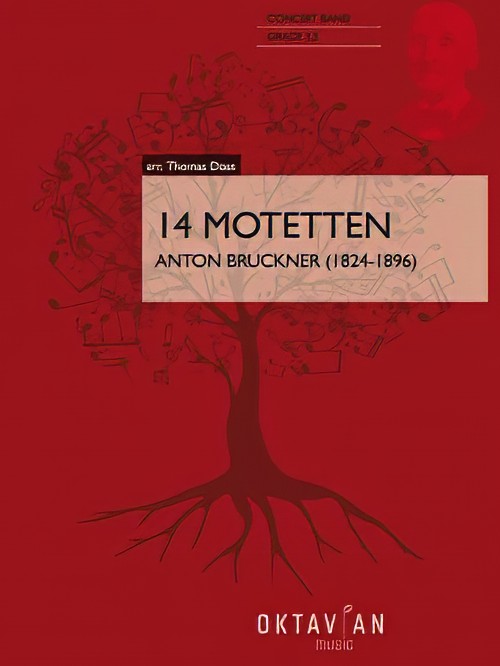 £256.00
£256.0014 Motetten (Concert Band - Score and Parts) - Bruckner, Anton - Doss, Thomas
Anton Bruckner (b. 4.9.1824, Ansfelden, d. 11.10.1896, Vienna) didn't have it easy. Throughout his life, the Austrian composer was plagued by self-doubt. Anton Bruckner came from a simple, rural background. After the death of his father, he was accepted as a choirboy at the monastery of Sankt Florian in 1837. After several years as a school assistant and his own organ and piano studies, he first worked as organist in St. Florian, then from 1855 as cathedral organist in Linz. Introduced to music theory and instrumentation by Simon Sechter and Otto Kitzler, he discovered Richard Wagner as an artistic role model, whom he admired throughout his life and also visited several times in Bayreuth. In 1868 Anton Bruckner became professor of basso continuo, counterpoint and organ at the Vienna Conservatory; ten years later court organist; and in 1891 finally honorary doctor of the University of Vienna. He was considered an important organ virtuoso of his era, but had to wait a long time for recognition as a composer. It was not until Symphony No.7 in E major, composed between 1881 and 1883, with the famous Adagio written under the effects of Wagner's death, that he achieved the recognition he had hoped for, even if he was reluctant to accept it given his inclination towards scepticism and self-criticism. Anton Bruckner was a loner who did not want to follow a particular school or doctrine. He composed numerous sacred vocal works, such as his three masses, the Missa Solemnis in B flat minor (1854), the Te Deum (1881-84) and numerous motets. As a symphonic composer, he wrote a total of nine symphonies and many symphonic studies from 1863 onwards, tending to revise completed versions several times over. Bruckner's orchestral works were long considered unplayable, but in fact were merely exceptionally bold for the tonal language of their time, uniting traditions from Beethoven through Wagner to folk music, on the threshold between late Romanticism and Modernism. Anton Bruckner composed about 40 motets during his lifetime, the earliest a setting of Pange lingua around 1835, and the last, Vexilla regis, in 1892. Thomas Doss has compiled some of these motets in this volume for symphonic wind orchestra. These motets show many characteristics of personal expression, especially Bruckner's colourful harmony in the earlier works, which is in places aligned with Franz Schubert (changes between major and minor; and movements in thirds). Later works are characterised by many components which, in addition to the expanded stature of the movements, include above all a sense of the instrumentation as an outward phenomenon and the harmony as a compositional feature that works more internally. Some aspects of Bruckner's work are the result of his long period of study, which familiarised him not only with the tradition of his craft, but also gave him insights into the modernity of his time in such composers as Wagner, Liszt and Berlioz. From this developed his personal standpoint, which always pursues the connection between the old and the new.Duration: 39.00
Estimated dispatch 7-14 working days
-
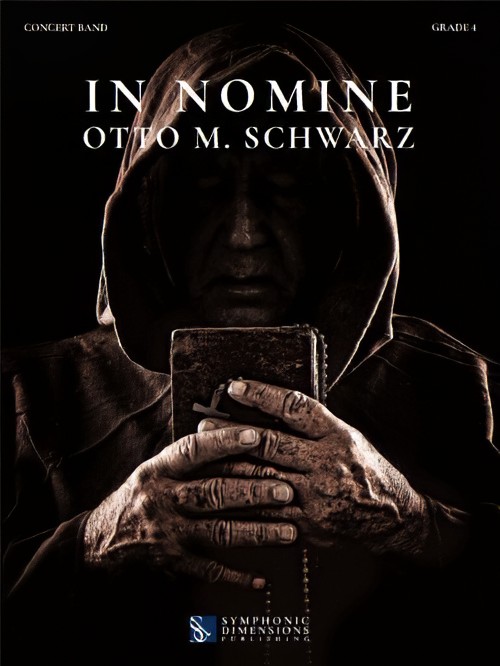 £159.99
£159.99In Nomine (Concert Band - Score and Parts) - Schwarz, Otto M.
How often has something been justified by, declared to be, or blessed as 'in the name of' some cause or other? How can it be that opposing armies and the use of weapons are ever 'in the name of...'? This is a common thread in the history of different faiths. Good was created but evil was committed and all 'in the name of...' This thread is also found in the history of the Premonstratensian Abbey at Wadgassen. The abbey was built in the 12th century on unfertile, desolate moorland, which later evolved into the most powerful religious community in the Saarland. The history of the abbey records quite astounding achievements under the motto desertum florebit quasi lilium ('the desert will bloom like a lily'); but also the harsh treatment of delinquents. The order had its own school, in which children were taught the seven liberal arts (which included music as well as geography and astronomy), but the poor were left to starve outside the abbey walls and were only allowed to eat from the members' leftovers on feast days. The medieval witch trials demanded their pound of flesh, and one group that fell victim were ecstatic dancers who moved wildly to music, which was interpreted as the devil's work. The result: a show trial that sentenced the dancers to death by fire. All in the name of... The year is 1789: Abbot Bordier is in the tenth year of his command. He does not yet know that he is to be the last abbot of an almost 700-year tradition. Not far from the abbey is the French border, which has long been making itself felt with the sound of gunfire, and the brothers continue to keep a nervous eye on it. The first portents of the French Revolution loom, but no one wants to believe it, that is, until the French pound the door down, storm the abbey and come right into the brothers' chambers. In a blind fury, all the pipes of the abbey organ are torn out, icons beheaded with swords and brothers beaten death while numerous buildings are set on fire. The abbey church is in flames. A frantic and desperate escape begins. Abbot Bordier and a handful of brothers make their getaway via the River Saar, adjacent to the abbey, to the neighbouring village of Bous. They survive, but their life, the Premonstratensian abbey, is destroyed. While they flee towards Prague and the sanctuary of the Strahov Monastery, the abbey at Wadgassen is razed to the ground and becomes a stone quarry. The desert blooms once more, however. A few short decades later, a glasswork arises from the foundations of the abbey. As peace returns to the region, it brings jobs and a new vision for its people.Duration: 11.15
Estimated dispatch 7-14 working days
-
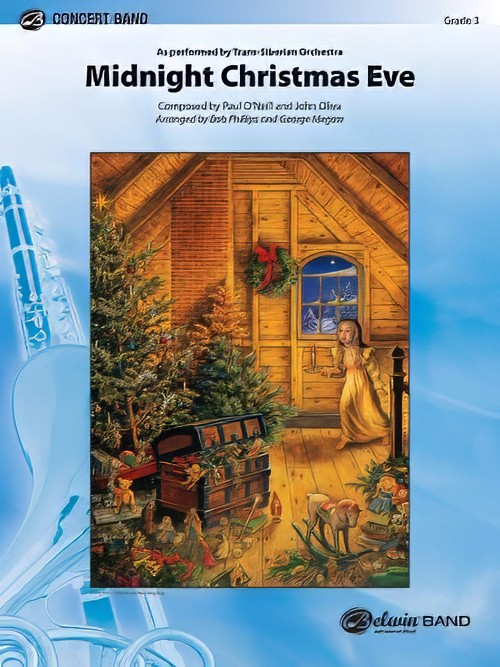 £73.00
£73.00Midnight Christmas Eve (Concert Band - Score and Parts) - O'Neill & Olivia - Megaw & Phillips
Imagine the quiet, the anticipation, the tree, and all the lights as Christmas Eve becomes Christmas and you will have the feel of this beautiful rock ballad. As seen in the Trans-Siberian Orchestra stage show, The Christmas Attic, this lyric piece will add depth to any holiday or winter concert. A suitable arrangement for high school bands, the optional electric bass, electric violin, and electric guitar parts provide the perfect chance to feature electric instruments and more advanced players. If you haven't seen TSO, check it out online and then share this one with your students. Perhaps include a field trip to see the band live with lights and effects. Duration: 4.00
Estimated dispatch 7-14 working days
-
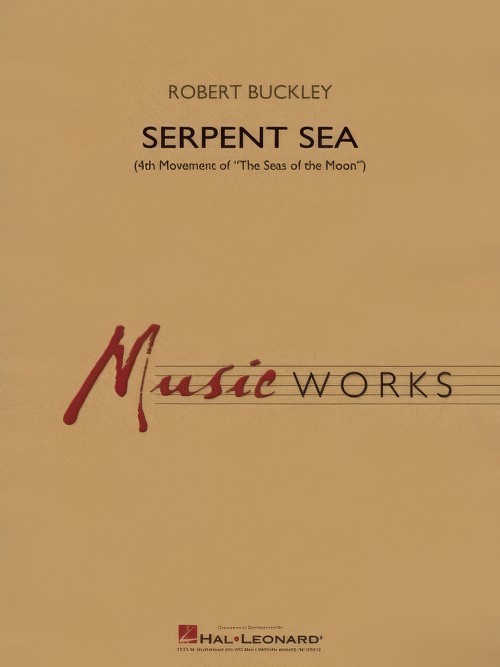 £79.99
£79.99Serpent Sea (Concert Band - Score and Parts) - Buckley, Robert
4th Movement of The Seas of the Moon. The fourth movement of Robert Buckley's grandly cinematic suite describing impressions of the "seas" of the moon, Serpent Sea is animated, exuberant and somewhat over-the-top. It was inspired by the idea of two huge winged serpents rising out of the waves and frolicking together in a wild, barbaric dance. The pair do, however, show a more graceful side every once in a while - represented by an exotic theme that starts in the clarinet and flute. The movement ends with a wild flurry as the serpents vanish back into the sea.Duration: 3:45
Estimated dispatch 7-14 working days
-
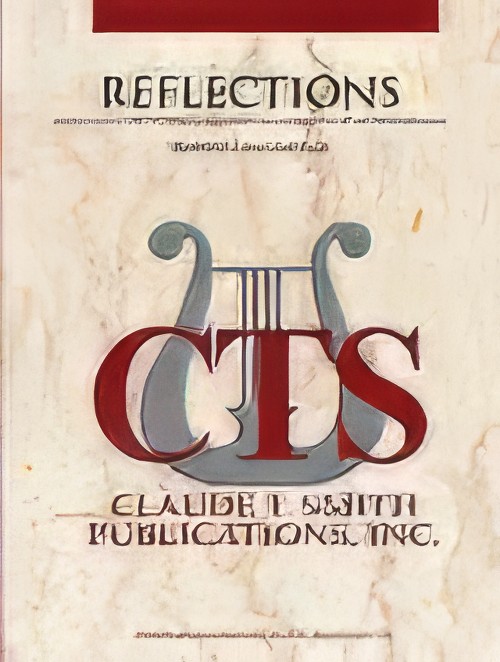 £96.00
£96.00Reflections (Concert Band - Score and Parts) - Langenfeld, Robert
Reflections is a musical portrayal of the people and moments in our lives which shape and change us. Musical elements from various sources are woven into a rich tapestry of sounds and colors that show the full expressive range of the band. Perfect for contest and festivals! Reflections by Robert Langenfeld, was commissioned by a consortium (alumni/friends/family/UCM Bands/ CTS Pubs) for Dr. Russell Coleman in celebration of his 90th birthday and his service as director of bands at the University of Central Missouri (CMSU) for 32 years. Langenfeld was given guidelines for the composition which included a clarinet soli (Coleman is a clarinetist), excerpts from "Dance Prelude" (commissioned by Dr. Coleman and the UCM Phi Mu Alpha chapter, written by Claude T. Smith for the CMSU (UCM) Band in 1978), the UCM Alma Mater and the UCM fight song, "Go Mules." This work was premiered on June 17, 2018 by the Warrensburg Community Band, under guest conductor, Dr. Anthony Pursell, at the 2018 Missouri Bandmasters Association Summer Convention at Tan-Tar-A in Osage Beach, MO. Dr. Russell Coleman has been the conductor for the Warrensburg Community Band since 1985. Duration: 5.30
Estimated dispatch 7-14 working days
-
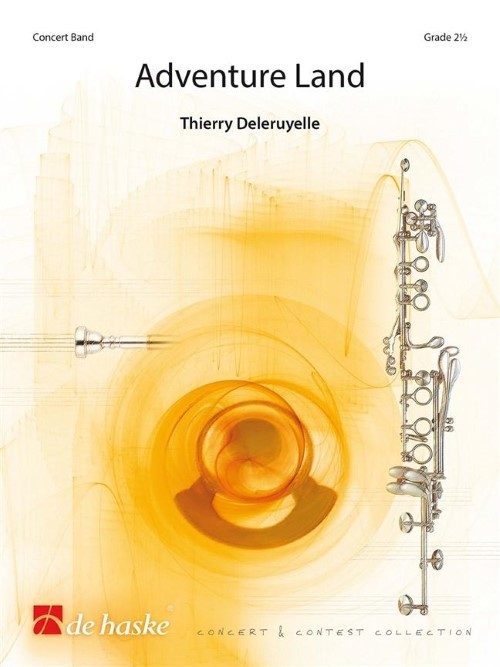 £89.99
£89.99Adventure Land (Concert Band - Score and Parts) - Deleruyelle, Thierry
Adventure Land was commissioned by Clermont Communaut and the CREA (the directors of the local music schools and conservatories) in France. This work was the opening piece of a show combining orchestra, choir and actors. The story takes place in the city of Clermont-Ferrand, which an explorer discovers through a series of riddles and adventures. Adventure Land is written in the form of a symphonic march which features a slow and pleasant passage in the middle of the work. The result is a dynamic and playful piece, similar to the style that one might find in cartoons or in animated films.Duration: 5.15
Estimated dispatch 7-14 working days
-
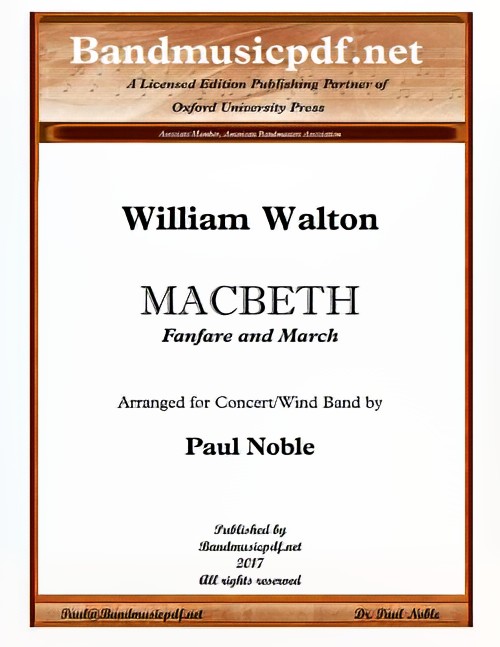 £110.00
£110.00Macbeth (Fanfare and March) (Concert Band - Score and Parts) - Walton, William - Noble, Paul
The following program notes are taken from those by Christopher Palmer, the arranger for orchestra from William Walton's incidental music for John Gielgud's production of Macbeth in 1941-42. The music was recorded and taken on tour with the production. Up to now it has remained in manuscript and unknown. Although this piece is called Fanfare and March, the principal march is in fact the banquet music (with its clever suggestion of bagpipes on the woodwind, hence my ad lib parts for extra flutes and oboes). Walton made several different versions of this for dramatic purposes, and here some of them have been pieced together. The central section of Trio is the March (Show) of the Eight Kings (Act 4, Scene 1) which reveals to Macbeth that Banquo's issue, not his, will rule in Scotland.
Estimated dispatch 7-14 working days
-
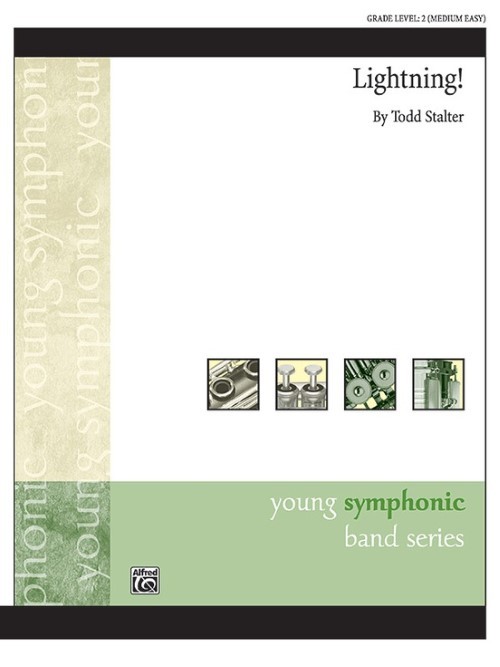 £62.95
£62.95Lightning! (Concert Band - Score and Parts) - Stalter, Todd
Lightning! was inspired by the awesome display of beauty and raw energy from a powerful spring thunderstorm that the composer observed in the night sky. Although the storm was almost 100 miles away, the sight of the accompanying electrical show was both an exhilarating and humbling experience. The aggressive parts of this composition attempt to portray the level of energy present in the storm, while the slow interior section provides an opportunity for listeners and performers alike to reflect on its visual beauty.Duration: 2.45
Estimated dispatch 7-14 working days
-
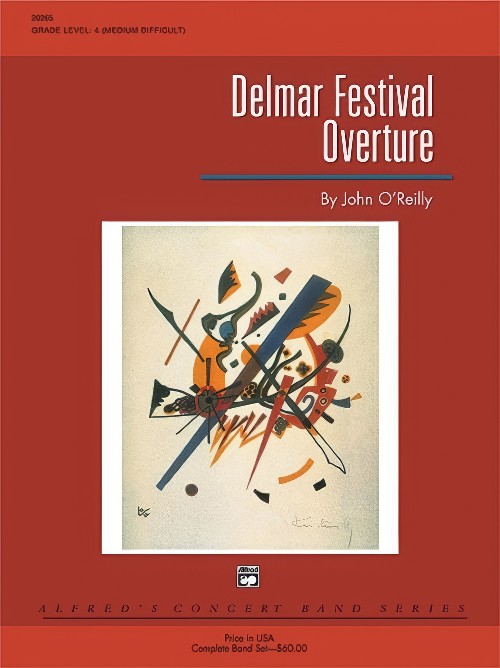 £58.50
£58.50Delmar Festival Overture (Concert Band - Score and Parts) - O'Reilly, John
Delmar Festival Overture is a powerful concert overture utilizing many of the contemporary compositional techniques that distinguish John O'Reilly's work. From the opening brass fanfare to the exciting conclusion, syncopated rhythms and numerous, interesting shifts of meter abound. Biting polychords establish the predominant harmonic structure for the opening "Allegro," but the majestic theme that follows in the horns and saxes takes on a decidedly British band style. The lyrical middle section begins with a fully scored chorale, which serves as the subject for a lovely melodic development featuring woodwinds and French horn. A brilliant brass fanfare ushers in a return to the opening section, which is now reorganized and further developed to bring this exciting overture to its dramatic conclusion. A great concert opener that will show off the talents of your musicians! Duration: 4.45
Estimated dispatch 7-14 working days
-
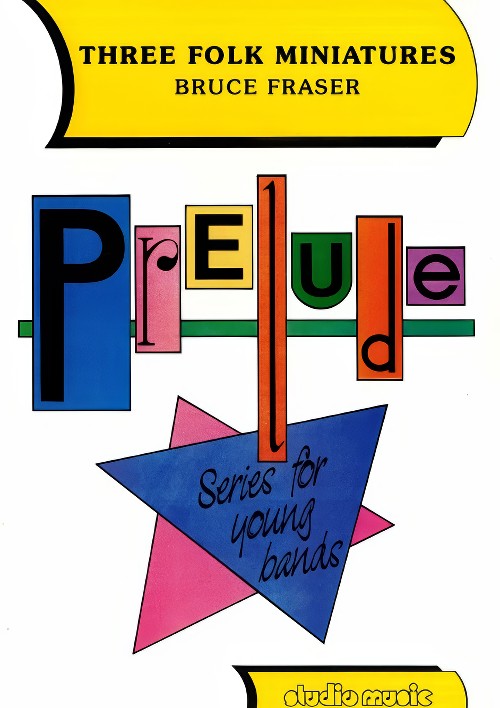 £44.95
£44.95Three Folk Miniatures (Concert Band - Score and Parts) - Fraser, Bruce
Three Folk Miniatures (Good Mornin' to Ye; Shepherd Song; When the Sun Shines) reflect the style of old English folk songs offering young players the opportunity to show off several acquired skills in performance.Titles in the Prelude Series are specifically scored for bands with few, if any, bass instruments but will sound well on larger ensembles. The bass line is playable by any combination of bass clarinet, bassoon, baritone saxophone, trombone, euphonium or tuba; in the event that none of these is available, the part for trombone/euphonium (B flat TC) can be played by tenor saxophone. The tuned percussion part is entirely optional and can be played by any available instrument(s). Each piece also includes a preliminary exercise. This is always in the same key as the accompanying piece and consists of a scale and chord progression that can be used for improving ensemble, balance, intonation and instrumental facility by changing tempo, articulation and dynamics.Duration: 2:20
Estimated dispatch 7-14 working days
